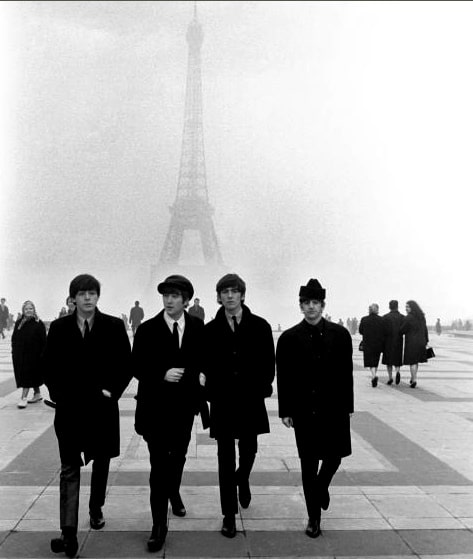Order counts. Observe the difference in these two short sentences:
“Get it over!”
“Get over it!”
If a nurse is about to insert a long, painful needle into your body, and you say tremulously, “Get it over,” he/she will no doubt have pity on you. But if you spout, “Get over it!” you might as well steel yourself for the shock of your life! Yeow!
My life is all about order. As a writer, beginnings, middles, and ends are my daily fare. As an aerobics teacher for 31 years, I learned that each class needed a warm-up, aerobic phase, warm down, floor-work phase, and cool-down. Putting the “cool-down” first would’ve resulted in torn muscles, at the very least. Order is crucial.
We value order so much that when something is desperately broken, we call it “Out of Order.”
Now, consider the case of Capitol Records. When they received The Beatles’ EMI LP tapes and were ready to cut their own versions of those LP’s, they did so, well…creatively. They threw the song order that The Beatles and George Martin had carefully selected to the wind!
Capitol must have been the rebel of the Beatles family who was dead determined to “do what they want[ed] to do and go where [they’re] goin’ to.” Indeed, they “thought for themselves,” because Capitol didn’t pay one whit of attention to the song order that mattered so much to George Martin and The Beatles.
Can you imagine the shock on Robert Frost’s face had he picked up a volume of his poetry, only to find his elegantly-crafted poem, “Stopping by the Woods on a Snowy Evening” jumbled thus:
“His house is in the village though;
He will not see me stopping here
Whose woods these are I think I know.
To watch his woods fill up with snow.”
Uh, what? That makes no sense at all! It’s a “hot mess,” as they say. However, if Frost’s creation had been tossed about randomly by the publisher, those four lines would have been the result.
Similarly, imagine an art gallery owner picking up brush and paint to alter Mona Lisa’s smile, to make it more pronounced! Imagine an exhibitor attaching arms to Venus de Milo. Audacious!
Now, envision the looks on The Beatles’ faces when they picked up Meet the Beatles, Capitol’s version of With the Beatles, an LP that Martin and The Beatles had carefully crafted to make a pre-determined and studied impact.
In his book, All You Need is Ears, George Martin said, “For me, making a record is like painting a picture in sound.” It was a work of art.
Quite deliberately, Martin had decided to open the LP with John’s passionate, rock’n’roll voice alone…no instruments, no other sound…just John’s raw and raspy, “It won’t be long…” It was gripping. It was, in essence, Lennon (and the band) symbolically announcing to the fans: “I’ve been gone for a few months, but now I’m back! I’ve missed you, as it were. But look, luv, here I am!” It was an unvarnished, goosebump-inducing moment.
But, Capitol (who’d come late to the party and was “playing catch up” by trying to combine two Beatles LPs into one) opted to open Meet the Beatles with “I Want to Hold Your Hand.”
Martin’s opener, “It Won’t Be Long,” was buried deep in the middle of Meet the Beatles, Side One.
Similarly, instead of closing the American LP with the gutsy potboiler, “Money,” (one of John’s finest Cavern staples) Capitol chose to say adieu to the fans with the far less impactful “Not a Second Time.”
So…how did The Beatles and George Martin react? Well, for the most part, they accepted the situations and went on with their business.
Read All You Need is Ears. You’ll hear George Martin praising Capitol’s superior recording equipment, calling the American sound, “much cleaner, much crisper.” (p. 145) You won’t find one grouse or criticism about Capitol’s liberal creative license.
When talking about the Meet the Beatles era, Martin does complain that Capitol’s Alan Livingston more or less pushed Martin out of the way when The Beatles toured The States and gave Martin zero credit. Livingston, Martin asserts, even introduced The Beatles as “Capitol recording artists.”
But, Martin says nothing about the injustice of having their artistic creations overhauled.
I’ve moved 32 times in 39 years of marriage. A good portion of my life has been spent in chaos: boxes everywhere, items on the floor for weeks before we can hang them, doors closed against disarray. But eventually, we settle in, and once again we discover that “there’s a place” for everything.
I’ve learned (as The Beatles must’ve learned when Capitol issued one strange album after another) to live with it and to fight the crucial fights (like finding the coffeemaker, the sheets, and the Bandaids!). I’ve learned that you can either allow loss of order to destroy you or you can live above it.
What would’ve happened, I ask you, had The Beatles flown into a full-blown swivet over the Capitol LPs? And what would happen if I lost my mind over never knowing where items are in my house? (In the shed? A box? Lost in transit?? Where is it?) Would that change things?
What would happen if today we let the horrible, nightmarish, evil events in Paris stop us dead in our tracks? Cripple us?
Like The Beatles, we must keep going. We must prepare ourselves to fight the big fights that most assuredly will come, to hold our heads up and forge ahead. We cannot be defeated by the loss of world order. We cannot give up and give into the chaos that swirls all around us.
The Beatles endured the sheer calamity of Beatlemania, the bedlam that was Apple, the mania of sycophants like Magic Alex who kept suggesting that things could be better, different, and more perfect…and in so doing, creating discontent. The Beatles carried on through years of upset, pandemonium, and confusion. They survived.
We, too, can survive the loss of order. If we try, we can press on.
The night of my high school graduation, a long-winded preacher prayed for over 10 minutes for the success of the graduates, the success of the school and the city and the state and the nation and I’m sure, the universe! On and on and on he went as we perspired in our dressy clothes and thick, slick robes. At long last, he ended his interminable prayer with this memorable phrase, “And Lord, just let us keep on keepin’ on!”
Of all the many words in his prayer, those are the ones I’ve never forgotten.
In this world of chaos, let’s take our cue from The Beatles and refuse to crumble. Even when our world is dramatically “out of order,” let’s put one foot in front of another and move ahead.
In the path of chaos, I hope that you and I will find a way to “keep on keepin’ on.” That’s my prayer.
Jude Southerland Kessler is the author of the John Lennon Series: www.johnlennonseries.com
Jude is represented by 910 Public Relations — @910PubRel on Twitter and 910 Public Relations on Facebook.










